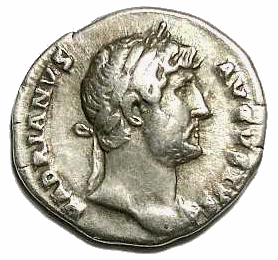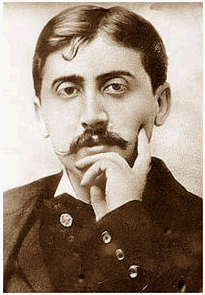Today’s Gay Wisdom
This entry was also this day’s Gay Wisdom email.
| / / | | / /THIS DAY IN GAY HISTORY
 On this date in the year 138 BCE, the Roman Emperor Hadrian, (b. 76) died. On a visit to Claudiopolis to survey damage from a recent earthquake and to dispense his largesse, Hadrian met the beautiful Antinous, a young boy who was destined to become the emperor’s "eromenos" — his beloved. Sources say nothing about when Hadrian met Antinous, however, there are depictions of Antinous that shows him as an exquisitely beautiful man of 20 or so. As this was shortly before Antinous’s drowning in 130 Antinous would more likely have been a youth of 13 or 14. Antinous may have been sent to Rome to be trained as page to serve the emperor and there rose to the status of imperial favorite. However it happened, he became Hadrian’s lifetime love, and upon his mysterious death by drowning in the Nile, spawned a rival religious movement to the early Christians, that also focused on a martyred youth, dying on behalf of the people, and providing restoration to life. Hadrian was grief struck and ordered cities to be named after the boy, medals struck with his effigy, and statues erected to him in all parts of the empire. Temples were built for his worship in Bithynia, Mantineia in Arcadia, and Athens; festivals celebrated in his honor and oracles delivered in his name. The city of Antinoöpolis or Antinoe was founded on the ruins of Besa where he died.
On this date in the year 138 BCE, the Roman Emperor Hadrian, (b. 76) died. On a visit to Claudiopolis to survey damage from a recent earthquake and to dispense his largesse, Hadrian met the beautiful Antinous, a young boy who was destined to become the emperor’s "eromenos" — his beloved. Sources say nothing about when Hadrian met Antinous, however, there are depictions of Antinous that shows him as an exquisitely beautiful man of 20 or so. As this was shortly before Antinous’s drowning in 130 Antinous would more likely have been a youth of 13 or 14. Antinous may have been sent to Rome to be trained as page to serve the emperor and there rose to the status of imperial favorite. However it happened, he became Hadrian’s lifetime love, and upon his mysterious death by drowning in the Nile, spawned a rival religious movement to the early Christians, that also focused on a martyred youth, dying on behalf of the people, and providing restoration to life. Hadrian was grief struck and ordered cities to be named after the boy, medals struck with his effigy, and statues erected to him in all parts of the empire. Temples were built for his worship in Bithynia, Mantineia in Arcadia, and Athens; festivals celebrated in his honor and oracles delivered in his name. The city of Antinoöpolis or Antinoe was founded on the ruins of Besa where he died. [Suggested reading: Royston Lambert Beloved and God: The Story of Hadrian and Antinous. (1997) ISBN 1-85799-944-
 On this day in 1871, the intellectual, novelist and essayist Marcel Proust was born. One of the first European writers to treat homosexuality at length, Proust is best known for his novel, Remembrance of Things Past. André Gide was the first to point out that Proust made certain characters female when he meant them to be male in the novel. For example, the character of Albertina was really based on Proust’s own chauffeur-lover Alfred Agostinelli. The book was first translated into English by C. K. Scott-Moncrieff between 1922 and 1931 in a bowdlerized version that removed many of the sexual aspects of the work. The work was recently retranslated from authoritative French originals to recover what had been lost.
On this day in 1871, the intellectual, novelist and essayist Marcel Proust was born. One of the first European writers to treat homosexuality at length, Proust is best known for his novel, Remembrance of Things Past. André Gide was the first to point out that Proust made certain characters female when he meant them to be male in the novel. For example, the character of Albertina was really based on Proust’s own chauffeur-lover Alfred Agostinelli. The book was first translated into English by C. K. Scott-Moncrieff between 1922 and 1931 in a bowdlerized version that removed many of the sexual aspects of the work. The work was recently retranslated from authoritative French originals to recover what had been lost.On this day in 1954 Neil Tennant was born. Tennant, who, with his colleague Chris Lowe, make up the pop duo, Pet Shop Boys. Although Tennant avoided the issue of homosexuality in the 1980s, preferring his lyrics to be androgynous, shortly after the release of 1993’s Very he publicly came out in Attitude, a UK Gay publication. According to the musician Tom Stephan aka Superchumbo, they had a two-year romantic relationship. Tennant was most recently the executive producer for Rufus Wainwright’s album Release The Stars, released in May 2007.
~ ~ ~
TODAY’S GAY WISDOM
 In 2005 White Crane published a special themed issue, "Our Bodies, Our Selves" in tribute to the groundbreaking women’s health book of the same name. At the time, we invited Eric Rofes, author of numerous books, including Reviving the Tribe, to write an essay on health and Gay men’s lives. Rofes amazing article, Gay Bodies, Gay Selves: Understanding the Gay Men’s Health Movement can found seen in the archives of White Crane.
In 2005 White Crane published a special themed issue, "Our Bodies, Our Selves" in tribute to the groundbreaking women’s health book of the same name. At the time, we invited Eric Rofes, author of numerous books, including Reviving the Tribe, to write an essay on health and Gay men’s lives. Rofes amazing article, Gay Bodies, Gay Selves: Understanding the Gay Men’s Health Movement can found seen in the archives of White Crane. That article grew a collaboration between White Crane Institute and Eric that became the Gay Men’s Leadership Academy [ http://gaywisdom.
Eric’s idea of an "academy" was to create an on-going dialogue among leaders from across various disciplines to bring in creative thinking. He posited that the origins of virtually all of the modern LGBT liberation movement wasn’t the result of "professionals" but of young people who didn’t know that things couldn’t be done, agitating and organizing to create new institutions to take care of LGBT people
Yesterday we began an excerpt from Eric Rofes visionary Reviving the Tribe and offered the first four prescriptions he offers at the end of that book. We continue with the next three today:
4. Support Both Separate and Mixed Spaces for HIV+ and HIV- Men
Few people deny that HIV-infected Gay men and people with AIDS need venues for support and discussion with men who share their status. From the early days of the epidemic, a peer model of emotional support has developed and entire organizations and networks of people with HIV/AIDS have coalesced around the need for shared wisdom to emerge out of a convocation of peers. In epicenter cities, social organizations, mental health support groups and even dating services have been established focused on the needs of HIV-positive Gay men.
Parallel organizing by uninfected men has met a great deal of resistance, but not always from HIV-infected men. Support groups for HIV-negative Gay men have been discounted, mocked and derided. Social programs which can fill a wide range of needs of uninfected men have been accused of "viral apartheid." In one Midwestern city, local activists protested the creation of services for HIV-negative Gay men, taking out advertising in the local media demanding that not one cent of AIDS-related funding be used to support these efforts. One therapist’s proposal to convene a workshop for HIV- men at a national Gay conference was met with derision. "Isn’t that like Germans getting together after World War II to congratulate each other on not being Jews? He was asked."
Survival is a critical issue for the Gay men’s community at this point in its development. It is a matter which deserves to be on the mind and lips of every Gay man, regardless of antibody status. People with HIV disease need to discuss long-term survival issues, treatment strategies, sex matters, and the natural history of HIV disease, as well as the torrent of feelings which accompany living with a life-threatening illness. HIV- Gay men need to discuss long-term survival issues, sex matters, and the impact of the epidemic on their psyches. Both of these discussions are valuable and both need to occur among peers of similar antibody status. By shaming uninfected men away from creating community with one another, a powerful message is delivered: you must be infected to merit attention and concern in this community.
Offering separate services and venues for Gay men of differing antibody statuses does not preclude a commitment to dialogue between men with HIV disease and uninfected men. In fact, such dialogue is essential for continued community building. While some have concluded that the Gay community has become fractured along antibody lines, my own experience with Gay men throughout the nation reveals a vast number of men of differing statuses in relationship together – either romantic, sexual, friendhip, political or professional. Few men have carved out lives entirely with men of the same antibody status.
In an ongoing epidemic we need spaces to come together and spaces to be apart. Individual men will find that certain times they will need to speak with others in similar situations to their own, and at other times, need to speak to a broader, more diverse group. For any community to fulfill its function as a place of support and sustenance amidst a continuing avalanche of loss, these differing needs unabashedly must be affirmed and supported.
5. Support Gay Men’s Involvement with Children and Youth
A common response to mass catastrophe which brings about loss of life and causes survivors to experience great amounts of infirmity and death, is to focus on affirming life through the reproduction of the species. After Hiroshima, Japanese culture experienced a fierce – almost obsessive – focus on reproduction, child-rearing, and the creation of the next generation of Japanese. Many populations which have suffered genocide during the 20th century have emerged from the experience to replenish their ranks and ensure their population’s survival in the face of decimation.
It should not surprise observers of community response to catastrophe to note increased Gay male interest and participation in becoming fathers, working with children and teenagers, and serving as sperm donors for Lesbians. Gay men’s interactions with children and youth have long been considered controversial due to the stigma of child molestation which society confers on Gay men. Despite progress made by the Gay movement, recent sex panics surrounding adult-child sex issues (charges against Michael Jackson, North American Man/Boy Love Association controversies) may have strengthened the linkage between Gay men and pedophilia in the public mind. Homosexual men have been involved in the lives of children for a long time – as child advocates, teachers, school administrators, social workers, children’s book authors, and the leaders of social, fraternal, and athletic networks – yet the majority of Gay men in these professions have remained closeted. Today Gay men working with children wrestle with overt discrimination and whispered allegations that arise when the relationship between children and gay men enters the public sphere.
The involvement of Gay men with children has changed dramatically since the start of the epidemic and may reflect both the natural development course of Gay liberation and a response to Gay men’s premature and overwhelming experience with death. Gay men’s increased involvement with fatherhood – as sperm donors, co-parents, adoptive parents and full-time fathers – has been commented upon extensively in the popular media which have cited in particular Gay men’s roles in the continuing "Lesbian baby boom" of the 1980s and 199s. Less visible has been the increased participation by Gay men in the creation and development of a wide range of educational, social and health-oriented services focused on Gay, Lesbian, bisexual and transgender and questioning youth.
…Lesbian and Gay community support for children and youth is likely to continue as the epidemic deepens. Yet the stake which Lesbians and Gay men have in these concerns appears to be distinct from that of certain ethnic, religious, and racial groups whose blood-line is threatened by genocidal action. Because Lesbian, Gay men and bisexuals need to neither reproduce nor "recruit" to ensure the survival of the queer tribe, the fear that AIDS will wipe out future Gay male life seems difficult to substantiate. Efforts aimed at fostering the health and well-being of future generations of queer youth focus less on reproducing the species and more on altering key institutions – schools, family, media, Boy Scouts, military, organized religion – which exert a powerful influence over the self-image and self-esteem of sexual minority youth. The increase attention and resources devoted to these matters in recent years represents an affirmation of life and a commitment to the future of the community.
6. Encourage The Celebration Of Life
During recent years concerns have surfaced amongst the leadership of Gay organizations and on the pages of the Gay press about the penchant which Lesbians and Gay men appear to have for parties, festivals, and mass celebrations. This is not a new debate. For many years, annual events marking Lesbian and Gay Pride Week were the subject of fierce debate about whether the convergence of the masses was to focus on either a "march" or a "parade," a "demonstration" or a "festival." While often the overt discussion focuses on politics versus culture, the conversation’
The March on Washington in 1993 raised this debate to an entirely different level. As the national Lesbian and Gay community was placed center stage during a brief period of unprecedented media visibility, several factors caused leaders of established organizations to question the "propriety" and usefulness of aspects of the weekend’s events. C-SPAN’s uninterrupted coverage of the rally at the U.S. Capitol exposed to millions of viewers bare-breasted Lesbians, flagrantly sexual Gay men, and one Lesbian’s declaration of desire for the First Lady. Religious extremists unveiled and mass-distributed controversial videotapes such as Gay Rights, Special Rights and The Gay Agenda, which included footage of local and national marches with special focus on controversial segments of the community (leatherfolk, sadomasochists, NAMBLA, clubkids.)
…While critiquing the focus, position and public relations of Gay community parties and celebrations is merited, leaders should resist any temptation to excoriate celebrations from its central position in the movement. Every oppressed group has created social and cultural outlets which affirm life and community values, even in the midst of extreme historical cataclysms. Any Tan, in The Joy Luck Club, provides rationale for celebration through the powerful voice of one of her central characters who struggled to survive the Cultural Revolution in China:
People thought we were wrong to serve banquets every week while many people in the city were starving, eating rats and, later, the garbage that the poorest rats used to feed on. Others though we were possessed by demons – to celebrate when even within our own families we had lost generations, had lost homes and fortunes, and were separated husband from wife, brother from sister, daughter from mother, Hnnnnh! How could we laugh? People asked.
It’s not that we had no heart or eyes for pain. We were all afraid. We all had our miseries. But to despair was to wish back for something already lost. Or to prolong what was already unbearable. How much can you wish for a favorite warm coat that hangs in the closet of a house that burned down with your mother and father inside of it? How long can you see in your mind arms and legs hanging from telephone wires and starving dogs running down the streets with half-chewed hands dangling from their jaws? What was worse, we asked among ourselves, to sit and wait for our own deaths with proper somber faces? Or to choose our own happiness?
While it might seem to some like a bizarre transmutation of reality to witness huge dance parties, upbeat street fairs, and endless parades of community celebrants while the epidemic rages among us, Gay men need not harbor any feeling of guilt about celebrating life when we are immersed in so much death. Rather than a denial of the ugliness and sorrow which intrude upon our daily lives, mass celebrations may affirm commitment to community and life, and offer a vision of ourselves broader than our illnesses and victimization. Gay men are caregivers, but more than caregivers; we suffer tremendous pain, but our pain is not all of who we are; we are surviving, but for our communal lives to have meaning, we must find ways to be more than survivors.
~ ~ ~
This entry was also this day’s Gay Wisdom email.
Sign up today to get our emails on Gay History and Wisdom!